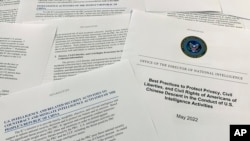ໃນຂະນະທີ່ບັນດາອົງການສືບລັບ ສະຫະລັດ ໄດ້ຂະຫຍາຍການປະຕິບັດການຂອງເຂົາເຈົ້າຕໍ່ ຈີນ ນັ້ນ, ບັນດາເຈົ້າໜ້າທີ່ລະດັບສູງຍອມຮັບວ່າເຂົາເຈົ້າອາດຈະເກັບກຳບັນທຶກການລົມໂທລະສັບ ແລະ ອີເມລ ຈາກຊາວອາເມຣິກັນເຊື້ອສາຍຈີນໃນທີ່ສຸດ, ກໍ່ໃຫ້ເກີດຄວາມເປັນຫ່ວງ ກ່ຽວກັບ ການສອດແນມທີ່ສົ່ງຜົນກະທົບຕໍ່ສິດທິຂອງບຸກຄົນ.
ລາຍງານສະບັບໃໝ່ຈາກຫ້ອງການຂອງຜູ້ອຳນວຍການສືບລັບແຫ່ງຊາດໄດ້ທຳການແນະນຳຫຼາຍຢ່າງ, ລວມມີການຂະຫຍາຍການຝຶກອົບຮົມ ກ່ຽວກັບ ຄວາມລຳອຽງໂດຍບໍ່ຮູ້ສຶກຕົວ ແລະ ກ່າວເນັ້ນຢູ່ພາຍໃນວ່າ ກົດໝາຍລັດຖະບານກາງຫ້າມການແນເປົ້າໃສ່ຄົນບາງຄົນຍ້ອນເຊື້ອຊາດຜິວພັນຂອງເຂົາເຈົ້າເທົ່ານັ້ນ.
ບັນດາອົງການສືບລັບ ສະຫະລັດ ແມ່ນໄດ້ຖືກກົດດັນຢ່າງເປັນປະຈຳເພື່ອໃຫ້ເຂົ້າໃຈດີກວ່າເກົ່າ ກ່ຽວກັບ ການທຳການຕັດສິນໃຈໃນບັນຫາຕ່າງໆທີ່ລວມມີອາວຸດນິວເຄລຍ, ພູມສາດການເມືອງ ແລະ ຕົ້ນກຳເນີດຂອງໂຣກລະບາດ ໂຄວິດ-19 ແລະ ໄດ້ຕອບສະໜອງດ້ວຍສູນກາງ ແລະ ໂຄງການໃໝ່ທີ່ເພັ່ງເລັງໃສ່ປັກກິ່ງ. ໃນຂະນະທີ່ມັນມີການສະໜັບສະໜູນຈາກສອງພັກການເມືອງສຳລັບການເອົາວິທີການທີ່ໜັກກວ່າເກົ່າຂອງ ສະຫະລັດ ຕໍ່ ຈີນ ນັ້ນ, ກຸ່ມສິດທິພົນລະເຮືອນ ແລະ ຜູ້ສະໜັບສະໜູນຕ່າງໆແມ່ນເປັນຫ່ວງ ກ່ຽວກັບ ຜົນກະທົບທີ່ແຕກຕ່າງກັນ ກ່ຽວກັບ ການຂະຫຍາຍຕິດຕາມປະຊາຊົນທີ່ມີເຊື້ອສາຍຈີນ.
ດັ່ງຕົວຢ່າງນຶ່ງ, ປະຊາຊົນຜູ້ທີ່ລົມກັບພີ່ນ້ອງ ຫຼື ຜູ້ຕິດຕໍ່ໃນ ຈີນ ອາດມີຄວາມເປັນໄປໄດ້ຫຼາຍກວ່າທີ່ການສື່ສານຂອງເຂົາເຈົ້າຈະຖືກລຶບ, ແນວໃດກໍ່ຕາມບັນດາອົງການສືບລັບແມ່ນບໍ່ສາມາດບອກຈຳນວນໄດ້ ສ່ວນນຶ່ງແມ່ນຍ້ອນຄວາມເປັນຫ່ວງຕໍ່ສິດທິຂອງບຸກຄົນ.
WASHINGTON (AP) — As U.S. intelligence agencies ramp up their efforts against China, top officials acknowledge they may also end up collecting more phone calls and emails from Chinese Americans, raising new concerns about spying affecting civil liberties.
A new report from the Office of the Director of National Intelligence makes several recommendations, including expanding unconscious bias training and reiterating internally that federal law bans targeting someone solely due to their ethnicity.
U.S. intelligence agencies are under constant pressure to better understand China’s decision-making on issues including nuclear weapons,geopolitics and the origins of the COVID-19 pandemic — and have responded with new centers and programs focusing on Beijing. While there’s bipartisan support for a tougher U.S. approach to China, civil rights groups and advocates are concerned about the disparate effect of enhanced surveillance on people of Chinese descent.
As one example, people who speak to relatives or contacts in China could be more likely to have their communications swept up, though intelligence agencies can’t quantify how often due in part to civil liberties concerns.




